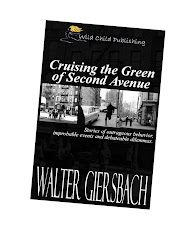My passion for authenticity began in Forest Grove, Oregon. Mom ordered me to run down to Cooper’s Grocery to buy the maple syrup she’d forgotten. I had to put down my new Amazing Tales comic and turn off Bobby Benson’s Saturday morning program from the B-Bar-B Ranch.
“And hurry!” she said. “I’m ready to put the pancake batter in the griddle.”
I trudged the long block down to 21st Street, another block past the Congregational Church, and a half block down Main Street to Cooper’s. All blocks are long when your eight-year-old legs aren’t very big.
Mr. Cooper was a daunting figure behind his brushy mustache and white apron. Silently, he’d leave the counter and fetch the item you wanted. I returned home with a bottle of Aunt Jemima syrup, thinking it was pretty clever to make a bottle in the shape of a woman wearing floor-length dress. This was beauty combined with utilitarian value.
Mom stared at me. “Why, this isn’t Log Cabin!”
“It’s the same thing,” I said defensively. “Anyway, I like the bottle.”
“It’s not one hundred percent maple syrup!” she explained, as though I had introduced heresy to our church service. “It’s not the real McCoy. Go back and tell Mr. Cooper you want the real thing.”
I plodded back. Red-faced with embarrassment, I said, “Mom wants Log Cabin maple syrup. The real McCoy.” He nodded wordlessly and went down one of the dark aisles to fetch the syrup in the metal can shaped like a log cabin. They were good cans, worth saving to build a town of homogeneous houses, a tabletop version of a pioneer town, but I already had several.
The real thing was important. Dad told cautionary tales of people in Germany so desperate they put chicory — whatever that was — and other foreign matter in their coffee. He said, “During the war, the Germans were so poor they would eat grass.”
Authenticity was paramount. Usually. Butter was always butter, for example, until Mom brought home a strange invention. “It’s margarine,” she explained.
“But it’s white,” I whined.
“It’s Parkay, and it’s white so people don’t think it’s real butter. It’s the law that you can’t fool people into thinking something is the real McCoy.”
The plastic bag resembled cheese curd from the creamery in our town, but with the addition of a little orange dot of dye. Invariably, I was ordered to massage the bag for half an hour until it all turned yellow. We knew it wasn’t real, but it was novel and cheaper, and so a trade-off was made.
Choosing between the real and the novel was a dilemma as the 1950s appeared. A Safeway supermarket opened two doors away from Cooper’s, and an entirely new item appeared: TV dinner: A TV dinner meant, by definition, eating in front of a television.
“We don’t have a TV,” Mom explained. “They’re much too expensive, and there’s only one station.”
“C’mon, Ma, buy some TV dinners,” I urged, although the only TV we knew about flickered in the window at Montgomery Ward’s. Several times she relented. Somehow, the thin slices of turkey didn’t taste like Mom’s cooking, and the mashed potatoes had so few lumps we wondered what they were made of.
The whole reality question came crashing back when my kids were growing up. My wife cooks scratch, and we’ve always had the smallest bag of tins and bottles to recycle. Meat, stir-fried vegetables, rice, salad — preparation takes a while, but the cooking goes together in a few minutes. Then I’d watch my kids' friends at the table.
“What’s that?” one would ask my son, and nudge him in the ribs.
“Beans.” Or spinach or broccoli or cabbage, usually with pieces of chicken, beef, or bacon.
“It doesn’t look like it.” Then, they’d settle for white bread and margarine. Reality had to come in brightly colored packages.
About that time, I was shocked to see Log Cabin had reduced the maple syrup content to 8 percent. Coffee with chicory from New Orleans is now a delicacy. Instant food became the norm for people who have a parking meter in their brain measuring time.
It’s tough finding the real McCoy in a world that’s accelerating.




